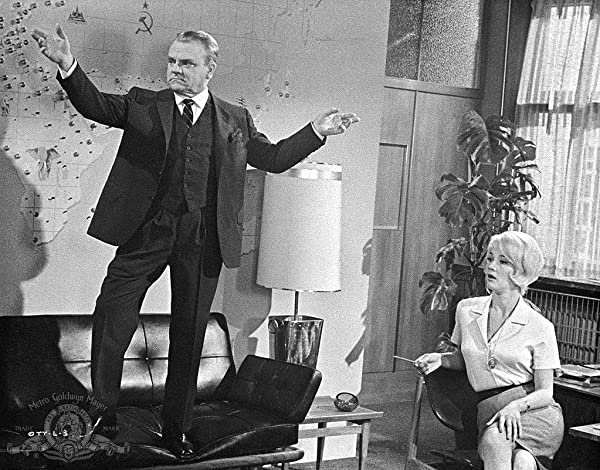Hidden Gem “One, Two, Three” (1961)

James Cagney and Liselotte Pulver star in “One, Two, Three.”
November 17, 2020
Billy Wilder was one of the most talented writers/directors who worked in Hollywood’s heyday from the mid-1940s. He won six Academy Awards for either directing or writing. At his peak, he created some of the most successful movies across many serious genres, several of these fine films became classics, like “Double Indemnity,” “The Lost Weekend,” “Sunset Boulevard” and “Witness for the Prosecution.”
By the late 1950s, he mastered comedy with a trio of classics. One of them includes “The Apartment,” the excellent romantic comedy about big city office politics with Jack Lemmon and Shirley MacLaine, that went on to win the Oscar for Best Picture of 1960.
Add to this comedic triple play is the very funny, the much-overlooked Cold War political hidden gem “One, Two, Three” (1961). Famed German director Volker Schlondorff referred to this film as a comic “masterpiece.” Based on a Hungarian play by Ferenc Molnar and loosely borrowing from Wilder’s screenplay of the 1939 Greta Garbo classic “Ninotchka,” this story was updated and set in West Berlin in 1961, just as the East Germans began building the Berlin Wall. Wilder collaborated on the screenplay with his frequent writing partner I. A, L. Diamond.
The film’s cast is led by middle-aged, tough guy James Cagney, featuring a hilarious clash of West and East cultures, with lots of playful mocking of serious German officiousness. Cagney is C. R. MacNamara, a Coca-Cola executive who’s hoping for a promotion as Coke’s European V-P. He has developed a unique plan to “bring down the wall” by selling the Russians his great American soft drinks.
Cagney propels this film as his performance and the pace of his machine-gun delivery of dialogue radiates sheer energy. He is simply hilarious; you’d wonder why he rarely made comedies in his long career.
Get The Daily Illini in your inbox!
His dialogue streams from his mouth as he barks orders over the phone, and he tries convincing three Soviet business officials of the benefits of his Coke products. “We can have six bottling plants, one in Moscow, Leningrad, Kiev, Stalingrad… You tried copying Coke, calling it “Kremlin Cola”—but even the Albanians wouldn’t drink it. You’ve got 300 million thirsty comrades!”
Every time his assistant Schlemmer enters his office, he stops at attention and clicks his heels with glee, driving MacNamara crazy.
In Cameron Crowe’s 1999 book “Conversations with Wilder,” Wilder recalled, “We were not going to be waiting for the laughs,” we had Cagney. “He really had the rhythm … just the speed was funny.” “The general idea was, let’s make the fastest picture in the world.”
MacNamara is also facing a dilemma with his boss in Atlanta. He has been assigned to keep his watchful eye out on his boss’ teenaged socialite daughter, Scarlett Hazeltine (Pamela Tiffin), who’s been traveling through Europe. When she arrives at the Berlin airport, she brags about being engaged four times already. Her two-week stay becomes two months, and she quickly finds herself a new East German boyfriend, Otto Ludwig Piffl (Horst Buchholtz). She secretly marries him.
When MacNamara tells her that she can’t marry and tries to get it annulled. When he calls him Commie, Scarlett explodes, “He’s not a Communist, he’s a Republican, from the Republic of East Germany.” Otto has just received a scholarship to the People’s Technological Institute to study as a missile engineer so that the young couple will be leaving for Moscow within days.
In addition to juggling his efficiently run office, maintaining a casual affair with his attractive blonde secretary, Fraulein Ingeborg (Liselotte Pulver), MacNamara’s frustrated wife Phyllis (Arlene Francis) and kids are forced to delay a planned vacation. Eventually, Phyllis becomes so upset she says she wants to go back home to the United States. When Scarlett reveals that she’s pregnant and MacNamara learns his boss, Mr. Hazeltine, will be arriving from Atlanta, all hell breaks loose.
With Cagney in his riotous top form, it’s ironic that after “One, Two, Three,” he would only make one more feature film before retiring, 20 years later with his cameo role in the historical drama “Ragtime.”






